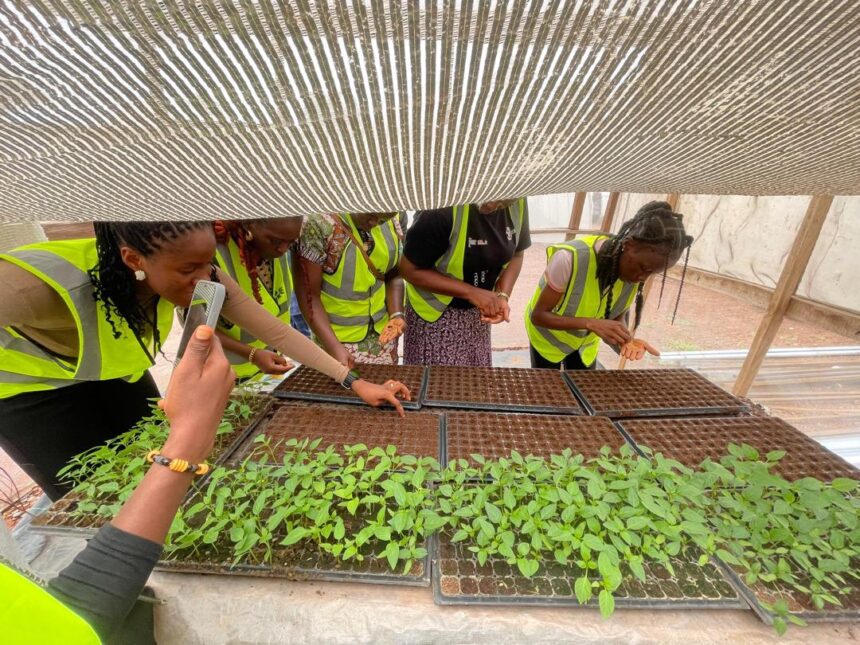In the quiet agrarian community of Aguobu Iwollo, nestled in Ezeagu Local Government Area of Enugu State, a revolution is taking root—one driven not by politics or promises, but by greenhouses, solar panels, and a new way of thinking about food and economic prosperity. On April 26, 2024, Manamuz Electric LTD, a homegrown innovator at the intersection of clean energy and agriculture, commissioned a Refrigerated Aggregation Center (RAC), an infrastructure that could redefine the future of food systems across Nigeria.
This initiative, funded through a strategic partnership between the United States African Development Foundation (USADF) and All On Partnerships for Energy Access, stands as a hallmark of what local ingenuity combined with international collaboration can achieve. More than just a building, the RAC in Aguobu Iwollo is a living, breathing solution to Nigeria’s age-old agricultural challenges—post-harvest losses, food insecurity, and farmer poverty.
“This project is more than a facility—it is a movement,” says Engr. Uzochukwu Mbamalu, CEO of Manamuz Electric. “We are merging renewable energy, smart agro-mechanization, and education to empower the people who feed the nation.”
A Game-Changer for Enugu’s Agricultural Economy
Enugu State, under the visionary leadership of Governor Barr. Dr. Peter Ndubuisi Mbah, is pioneering what could become one of Nigeria’s most transformative agricultural movements. With a goal of deploying over 2,000 greenhouse farms across the state by 2026, the government is promoting localized vegetable production through a strategic “Anchor Cluster” model. This model centralizes essential infrastructure—solar-powered irrigation, cold storage, and logistics support—within accessible hubs that can serve clusters of both greenhouse and open-field farmers.
Each cluster is a micro-economy, a center of learning and trade, where knowledge meets practice and local farmers become empowered agro-entrepreneurs. It’s a deliberate departure from subsistence farming toward scalable agribusiness. And at the heart of this shift are the Coldbox Stores—digitized refrigerated aggregation centers built and managed by Manamuz Electric to preserve fresh produce, extend shelf life, and reduce food waste.
Manamuz Electric: Powering Prosperity with Clean Energy
Manamuz Electric isn’t just a power company; it’s a catalyst for rural transformation. Headquartered in Enugu, the company has completed four Coldbox Store projects across Nigeria, each engineered to serve the first mile of the agricultural value chain—where the journey from farm to fork begins. Their newest facility in Aguobu Iwollo integrates a pre-cooling room, cold storage, off-grid solar energy plant, electric transport, irrigation systems, and demonstration greenhouses—all designed to support up to 1,500 horticulture farmers.
“These farmers grow 80% of the food we eat, yet they suffer the most,” said Mbamalu. “We are giving them the tools, infrastructure, and knowledge to compete and thrive in both local and global markets.”
International and local partners, including the Mandela Washington Fellowship Alumni Association of Nigeria (MWFAAN), Ecozen Solutions India, Swap Technologies, the Enugu State Polytechnic (ESPOLY), and Godfrey Okoye University, are actively involved in scaling the initiative. ESPOLY, for instance, manages the training hub at Aguobu Iwollo where farmers—especially women and youth—are taught climate-smart agricultural practices and greenhouse management. Already, 600 farmers have been registered through the Ezedike Farmers Cooperative Society and Enugu State Marketing Company.
Meanwhile, the anchor greenhouse clusters integrate shared infrastructure: a 35-kilowatt solar plant, 15,000-liter water tanks, and Coldbox Stores capable of extending the shelf life of vegetables from a few days to over three weeks. These technologies are not just increasing food supply—they’re building wealth.
The Economy of Greenhouse Farming
With Nigeria’s vegetable market valued at over $31 billion and growing at a projected CAGR of 11.16% (2025–2029), Enugu’s investment in horticulture is both strategic and visionary. Greenhouse farming allows year-round cultivation, controlled nutrient delivery, and increased yields—up to 800% more than traditional methods. It also ensures consistent quality, a critical factor for high-value export markets.
The pilot cluster model in Enugu features 100 greenhouses organized into five hubs of 20 greenhouses each. Each cluster will employ 160 people and include its own Coldbox Store. These clusters are not just producing vegetables—they’re producing jobs. Over 50 direct jobs are being created through the local manufacturing of greenhouses in Enugu, while 800 more are expected from the full rollout of the pilot project alone.
A Blueprint for Agricultural Transformation
Beyond vegetables, Manamuz Electric is collaborating with other agribusinesses like Upland Poultry and Mary Agro Farms to build Coldbox Stores for poultry, fish, and livestock. This diversification ensures the state’s cold-chain infrastructure supports all sectors of agriculture.
Ikpa Perishables Market in Nsukka, one of the largest in Southeast Nigeria, is also in line for revitalization. Despite being a major outlet for tomatoes and other perishables, farmers in the region suffer from poor yields, lack of storage, and post-harvest losses. With Coldbox infrastructure and training, Manamuz aims to transition these farmers from subsistence to commercial agriculture.
But perhaps the most revolutionary aspect of Enugu’s agricultural transformation is its educational integration. Through partnerships with institutions like the University of Nigeria Nsukka, Godfrey Okoye University, and the College of Business at the University of Nevada-Reno, the project is bridging academia and grassroots practice. Youth training programs like WATEA-Nigeria are also equipping young people with skills to manage greenhouses, ensuring sustainability through generational knowledge transfer.
Conclusion: Feeding the Nation, Empowering the People
Enugu’s Agriculture for Economic Transformation initiative is more than a state project—it’s a scalable model for Nigeria and the African continent. By localizing food production, powering infrastructure with clean energy, and integrating education and entrepreneurship, the state is not only tackling food insecurity but rewriting its economic future.
As Governor Mbah noted through his representatives during the commissioning ceremony: “This is not just about farming—it’s about building a future where our people eat what they grow, earn from what they sell, and thrive in the land they call home.”
In Enugu, the seeds of prosperity are being planted—not just in soil, but in minds, infrastructures, and communities. And as these seeds grow, they promise to nourish not just a state, but a nation.
Nzubechukwu Eze









